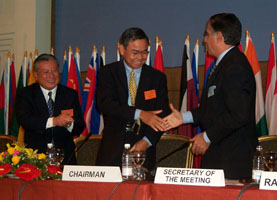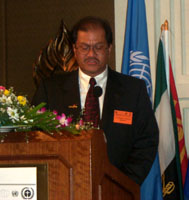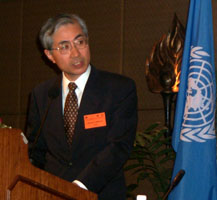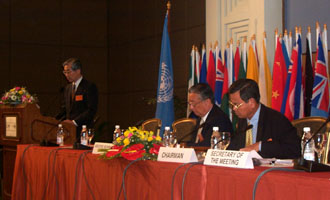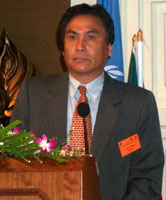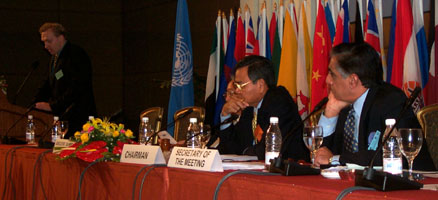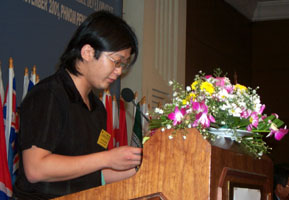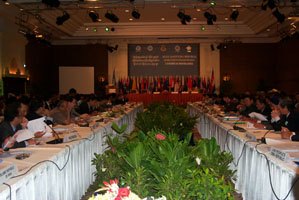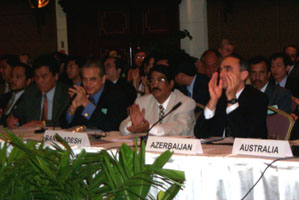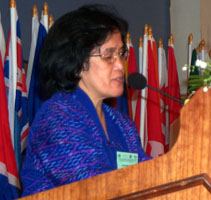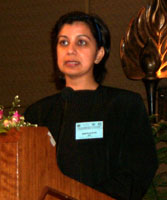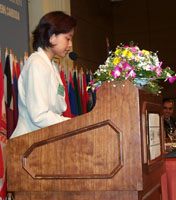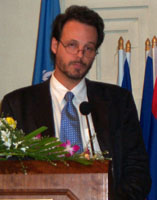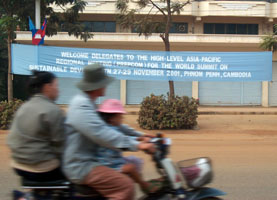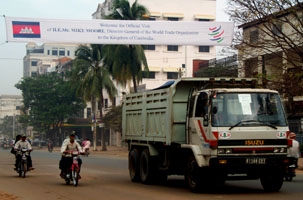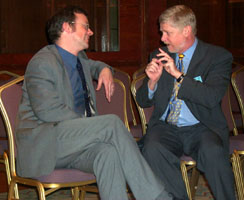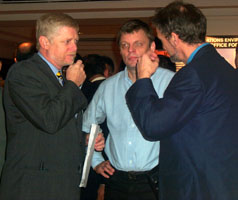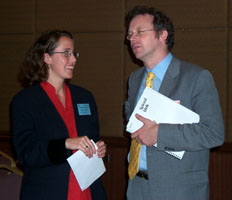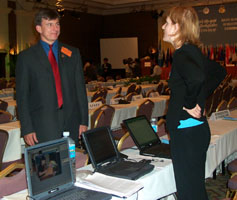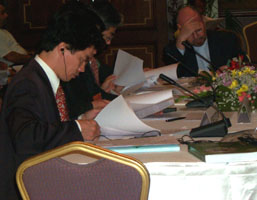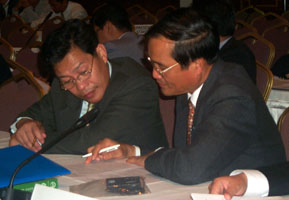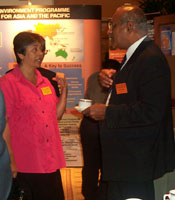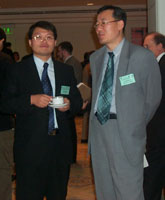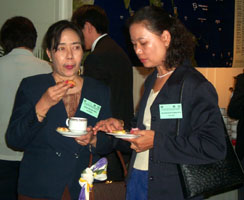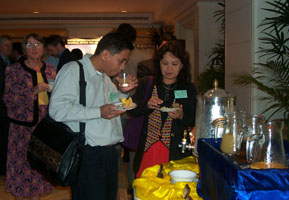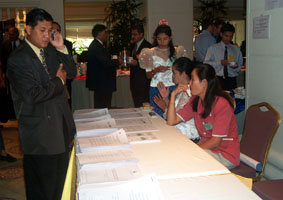 |
|
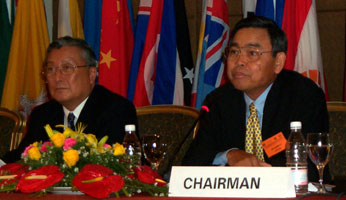 On
Thursday, 29 November, delegates adopted the Phnom Penh Regional
Platform on Sustainable Development for Asia and the Pacific after
negotiations on the document continued all night on Wednesday until
early Thursday morning. Delegates also continued to hear statements
from governments, UN agencies, international organizations and civil
society. The Regional Platform on Sustainable Development for Asia
and the Pacific includes sections on the regional assessment of
the implementation of Agenda 21. It also includes a section on key
issues and priorities for sustainable development, which includes
subsections on: economic and social issues (chronic and persistent
poverty, impact of globalization, sustainable energy development,
human settlements development, unsustainable consumption and production
patterns, human development, coping with natural disasters, and
sustainable agriculture for food security); environmental and natural
resources (land and biodiversity, oceans and coastal resources,
freshwater resources, energy and mineral resources, atmosphere and
climate change, and island vulnerability); and cross-cutting issues
(policy challenges for sustainable development, institutional reform
and governance, capacity-building, enabling informed decision-making,
technology transfer, promoting participation of and partnership
with major groups, and ensuring gender equality and gender justice).
The Platform also outlines follow-up actions including subsections
on goals and targets, Asia-Pacific initiatives and implementation
mechanisms. Asia-Pacific initiatives address: capacity-building
for sustainable development; poverty reduction for sustainable development;
cleaner production and sustainable energy; land management and biodiversity
conservation; protection and management of and access to freshwater
resources; oceans, coastal and marine resources and sustainable
development of small island States; and action on atmosphere and
climate change. Implementation mechanisms are addressed at the national,
regional/subregional and global levels. In addition, the Platform
addresses the issue of financing sustainable development.
Photo: Kim Hak-Su, ESCAP Executive Secretary (left) with Chair Mareth
Mok, Cambodian Environment Minister On
Thursday, 29 November, delegates adopted the Phnom Penh Regional
Platform on Sustainable Development for Asia and the Pacific after
negotiations on the document continued all night on Wednesday until
early Thursday morning. Delegates also continued to hear statements
from governments, UN agencies, international organizations and civil
society. The Regional Platform on Sustainable Development for Asia
and the Pacific includes sections on the regional assessment of
the implementation of Agenda 21. It also includes a section on key
issues and priorities for sustainable development, which includes
subsections on: economic and social issues (chronic and persistent
poverty, impact of globalization, sustainable energy development,
human settlements development, unsustainable consumption and production
patterns, human development, coping with natural disasters, and
sustainable agriculture for food security); environmental and natural
resources (land and biodiversity, oceans and coastal resources,
freshwater resources, energy and mineral resources, atmosphere and
climate change, and island vulnerability); and cross-cutting issues
(policy challenges for sustainable development, institutional reform
and governance, capacity-building, enabling informed decision-making,
technology transfer, promoting participation of and partnership
with major groups, and ensuring gender equality and gender justice).
The Platform also outlines follow-up actions including subsections
on goals and targets, Asia-Pacific initiatives and implementation
mechanisms. Asia-Pacific initiatives address: capacity-building
for sustainable development; poverty reduction for sustainable development;
cleaner production and sustainable energy; land management and biodiversity
conservation; protection and management of and access to freshwater
resources; oceans, coastal and marine resources and sustainable
development of small island States; and action on atmosphere and
climate change. Implementation mechanisms are addressed at the national,
regional/subregional and global levels. In addition, the Platform
addresses the issue of financing sustainable development.
Photo: Kim Hak-Su, ESCAP Executive Secretary (left) with Chair Mareth
Mok, Cambodian Environment Minister
|
|
|
 Chair
Mareth Mok presents the Chairman's Summary Report, outlining
the main emergent points, inter alia, the diversity in
composition of and issues facing the region and the need for stakeholder
involvement in the decision-making process. In his closing remarks,
he expressed his deep gratitude to the Royal Government of Cambodia
and the meeting organizers and thanked participants for their
excellent input, valuable comments and suggestions, stating he
is confident that the meeting's dialogue will be helpful to the
WSSD.
Chair
Mareth Mok presents the Chairman's Summary Report, outlining
the main emergent points, inter alia, the diversity in
composition of and issues facing the region and the need for stakeholder
involvement in the decision-making process. In his closing remarks,
he expressed his deep gratitude to the Royal Government of Cambodia
and the meeting organizers and thanked participants for their
excellent input, valuable comments and suggestions, stating he
is confident that the meeting's dialogue will be helpful to the
WSSD.
|
 In
his closing statement, Kim Hak-Su,
ESCAP Executive Secretary expressed
his pleasure with the meeting's successful decisions and noted
that the regional message and program adopted at Kitakyushu provide
a roadmap for sustainable development for the next decade, urging
the development of concrete programs for funding and implementation.
In
his closing statement, Kim Hak-Su,
ESCAP Executive Secretary expressed
his pleasure with the meeting's successful decisions and noted
that the regional message and program adopted at Kitakyushu provide
a roadmap for sustainable development for the next decade, urging
the development of concrete programs for funding and implementation.
|
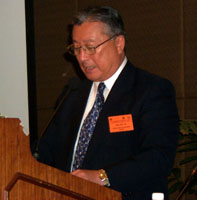
|
|
Statements
by governments, UN agencies, international organizations and civil
society
|
 The
Republic of Korea suggested
priority areas for sustainable development activities, inter alia:
developing a policy framework for stakeholder participation; addressing
transboundary air pollution issues and desertification; and promoting
the use of information and communication technology.
The
Republic of Korea suggested
priority areas for sustainable development activities, inter alia:
developing a policy framework for stakeholder participation; addressing
transboundary air pollution issues and desertification; and promoting
the use of information and communication technology.
|
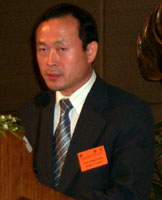
|
|
|
 Malaysia
noted that intellectual property regimes have made technology transfer
more costly, stressed that the increase of speculative and short-term
financial flows has introduced more instability into the global
financial system, and maintained that domestic resource mobilization
does not fill resource gaps in the region.
Malaysia
noted that intellectual property regimes have made technology transfer
more costly, stressed that the increase of speculative and short-term
financial flows has introduced more instability into the global
financial system, and maintained that domestic resource mobilization
does not fill resource gaps in the region.
|
 China
outlined
progress made in, and positive results arising from, its implementation
of Agenda 21, which is China's development framework, and acknowledged
poverty and inequity as key challenges. She noted the unfulfilled
international commitments that undermined the attainment of sustainable
development and, expressing hope that the WSSD could revitalize
the Rio spirit, proposed ways to do so.
China
outlined
progress made in, and positive results arising from, its implementation
of Agenda 21, which is China's development framework, and acknowledged
poverty and inequity as key challenges. She noted the unfulfilled
international commitments that undermined the attainment of sustainable
development and, expressing hope that the WSSD could revitalize
the Rio spirit, proposed ways to do so.
|
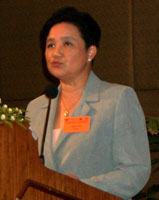
|
|
Japan
(above) called for: the use of science and technology to reduce
environmental impacts and manage natural disasters; full implementation
of the Kitakyushu Declaration and the Kyoto Protocol; technology
transfer and capacity building; South-South cooperation; addressing
forest crimes such as illegal logging; development of trade rules
for sustainable utilization; and improvement of environmental education
programs.
|
|
The
Democratic People's Republic of Korea highlighted efforts made
towards implementation of Agenda 21, noting that the region had
not made remarkable achievements despite regional action plans and
meetings and that poverty is still prevalent, as well as natural
disasters due to climate change and unequal distribution of wealth.
He highlighted the importance of financing and technology transfer
and called for, inter alia, the IMF to provide unconditional development
financing.
|
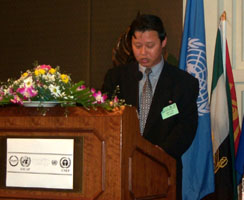
|
|
|
 Bhutan
noted
that the Asia Pacific subregional conferences show Rio commitments
remain unfulfilled and stated that regional poverty is alarming.
He endorsed the core principle of development, and the concept of
"gross national happiness." He also noted that Bhutan has drafted
a national environmental strategy and established an environmental
trust fund.
Bhutan
noted
that the Asia Pacific subregional conferences show Rio commitments
remain unfulfilled and stated that regional poverty is alarming.
He endorsed the core principle of development, and the concept of
"gross national happiness." He also noted that Bhutan has drafted
a national environmental strategy and established an environmental
trust fund. |
 Nepal
described commitments to: transboundary regional conservation; experimental
reserves; ecotourism and service sector contributions to poverty
alleviation; and tax incentives for cleaner vehicles. He expounded
on reliance on and vulnerability of mountain ecosystems, and the
need for their sensitive management.
Nepal
described commitments to: transboundary regional conservation; experimental
reserves; ecotourism and service sector contributions to poverty
alleviation; and tax incentives for cleaner vehicles. He expounded
on reliance on and vulnerability of mountain ecosystems, and the
need for their sensitive management. |
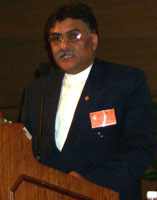
|
 Reminding delegates
that the Asia-Pacific region has more than half the world's population,
India
said the region has a responsibility to ensure the WSSD process
is more action-oriented and meaningful. He highlighted: the eradication
of poverty, hunger, illiteracy and disease; appropriate pricing
for fuels and proper valuation of natural resources; cost-effective
technologies related to recycling and waste minimization; and the
North's ecological debt.
Reminding delegates
that the Asia-Pacific region has more than half the world's population,
India
said the region has a responsibility to ensure the WSSD process
is more action-oriented and meaningful. He highlighted: the eradication
of poverty, hunger, illiteracy and disease; appropriate pricing
for fuels and proper valuation of natural resources; cost-effective
technologies related to recycling and waste minimization; and the
North's ecological debt. |
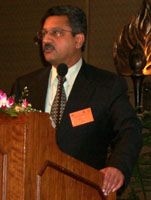
|
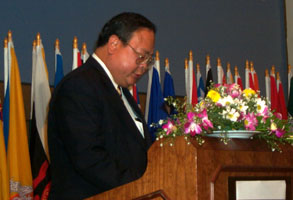 |
Thailand
described domestic activities toward implementation of Agenda
21, and identified remaining challenges, such as addressing sustainable
development in the midst of globalization. He emphasized poverty
reduction and job creation at the grassroots level, and called
for creation of a compensation mechanism for damages to the environment
and to quality of life.
|
Kyrgyzstan
emphasized the vulnerable and unstable nature of mountainous habitats,
which is manifested in natural disasters such as floods and mudslides.
He said problems associated with desertification and land degradation
are the most important concern for the Central Asian countries,
and called for debt-for-nature swaps in the region. He suggested
that one factor feeding terrorism networks is failure to implement
concepts from the Rio conference.
|
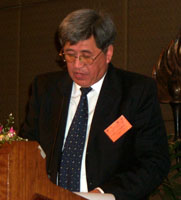
|
 |
 The
Islamic Republic of Iran detailed his country's sustainable
development achievements, including the Iranian National Committee
on Sustainable Development (INCSD), a comprehensive air pollution
abatement plan for Tehran, environment impact assessment legislation
to avoid unsustainable policies, and the role of civil society.
He emphasized the importance of dialogue between civilizations to
achieve sustainable development, and noted the need to address the
root causes of poverty, including wars and armed conflict that also
lead to environment degradation.
The
Islamic Republic of Iran detailed his country's sustainable
development achievements, including the Iranian National Committee
on Sustainable Development (INCSD), a comprehensive air pollution
abatement plan for Tehran, environment impact assessment legislation
to avoid unsustainable policies, and the role of civil society.
He emphasized the importance of dialogue between civilizations to
achieve sustainable development, and noted the need to address the
root causes of poverty, including wars and armed conflict that also
lead to environment degradation.
|
 Armenia
highlighted transboundary issues of regional and global
consequence, urging cooperation, and noted that 2003 is the year
of freshwater, urging the development of a regional strategy particularly
addressing transboundary waterways. He highlighted his government's
action program for poverty reduction and called for: market reforms;
technical assistance to post-industrial countries; external debt
relief in return for program development; and the redistribution
of globalization benefits.
Armenia
highlighted transboundary issues of regional and global
consequence, urging cooperation, and noted that 2003 is the year
of freshwater, urging the development of a regional strategy particularly
addressing transboundary waterways. He highlighted his government's
action program for poverty reduction and called for: market reforms;
technical assistance to post-industrial countries; external debt
relief in return for program development; and the redistribution
of globalization benefits. |
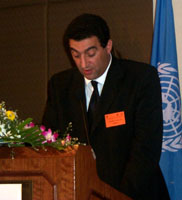
|
|
Azerbaijan
stressed the social, environment, and economic consequences of armed
conflicts in his country, which has over one million refugees living
in camps. He called for: poverty reduction; food security; regional
infrastructure development that minimizes environmental impacts;
and for national administrative reform involving government capacity-building
and civil society participation for good governance.
|
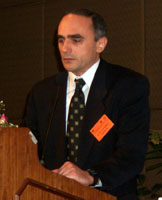
|
|
The
Marshall Islands
cogitated whether WSSD will produce another blueprint for failure;
stressed that sustainable development is not only environment, but
includes economic, social and cultural dimensions; and noted commitment
to avoiding the adverse effects of sea level rise from global warming.
|
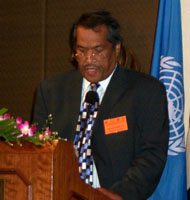
|
 Bradnee Chambers, United Nations University, highlighted
UNU's role as providing a forum for informal dialogue among UN
member states and key stakeholders, and described the "Interlinkages"
research initiative and their work on urban centers.
Bradnee Chambers, United Nations University, highlighted
UNU's role as providing a forum for informal dialogue among UN
member states and key stakeholders, and described the "Interlinkages"
research initiative and their work on urban centers.
|
|
|
|
 The
Third World Network urged renewed internationalism on financing
for development, and called for: the untying of aid; donor coordination
and accountability; responsible lending by multilateral financing
institutions; and the continued provision of basic services to citizens
by governments. He called on developing countries to pull together
to drive the WSSD agenda at the UN level.
The
Third World Network urged renewed internationalism on financing
for development, and called for: the untying of aid; donor coordination
and accountability; responsible lending by multilateral financing
institutions; and the continued provision of basic services to citizens
by governments. He called on developing countries to pull together
to drive the WSSD agenda at the UN level.
|
|
|
 The
Asia-Pacific Forum on Women, Law and Development stated
that research findings indicate women bear the worst effects from
activities such as industrial logging, commercial fishing, intensive
use of pesticides in agriculture, toxic waste dumping and nuclear
testing. She discussed the domestic burdens of women, threats
to food security and urban migration for employment.
The
Asia-Pacific Forum on Women, Law and Development stated
that research findings indicate women bear the worst effects from
activities such as industrial logging, commercial fishing, intensive
use of pesticides in agriculture, toxic waste dumping and nuclear
testing. She discussed the domestic burdens of women, threats
to food security and urban migration for employment.
|
 Kanta
Kumari, Global Environment Facility (GEF), elaborated
on their financial situation, and said that new responsibilities
and funding for the GEF provide expanded opportunities for work
in the Asia-Pacific region toward overcoming environmental challenges.
She highlighted new work in the region on integrated ecosystem
management, and expressed hope that the GEF will serve as a catalyst
in forging partnerships among, inter alia, governments, NGOs,
the private sector and indigenous peoples.
Kanta
Kumari, Global Environment Facility (GEF), elaborated
on their financial situation, and said that new responsibilities
and funding for the GEF provide expanded opportunities for work
in the Asia-Pacific region toward overcoming environmental challenges.
She highlighted new work in the region on integrated ecosystem
management, and expressed hope that the GEF will serve as a catalyst
in forging partnerships among, inter alia, governments, NGOs,
the private sector and indigenous peoples.
|
|
|
|
 Adelina
D. Ekawati, Association of Southeast Asian Nations (ASEAN),
noted
ASEAN's mandate to coordinate all regional activities implemented
by other organizations in the region and highlighted the ASEAN
vision 20/20, which envisions a Clean and Green ASEAN. She also
pointed to constraints in terms of financial, technical, capacity
and human resources in implementing Agenda 21, but also pointed
to achievements made in the area of environmental protection.
Adelina
D. Ekawati, Association of Southeast Asian Nations (ASEAN),
noted
ASEAN's mandate to coordinate all regional activities implemented
by other organizations in the region and highlighted the ASEAN
vision 20/20, which envisions a Clean and Green ASEAN. She also
pointed to constraints in terms of financial, technical, capacity
and human resources in implementing Agenda 21, but also pointed
to achievements made in the area of environmental protection.
|
 Yukiko
Oda, Kitakyushu Forum on Asian Women (KFAW) noted
that the integration of gender equality is considered by this
region as a separate, crosscutting issue, and emphasized that
sustainable development issues affect women differently, for example,
the disproportionate loss of jobs as a result of disasters. She
urged that integration and mainstreaming of gender is crucial
for the achievement of sustainable development.
Yukiko
Oda, Kitakyushu Forum on Asian Women (KFAW) noted
that the integration of gender equality is considered by this
region as a separate, crosscutting issue, and emphasized that
sustainable development issues affect women differently, for example,
the disproportionate loss of jobs as a result of disasters. She
urged that integration and mainstreaming of gender is crucial
for the achievement of sustainable development.
|
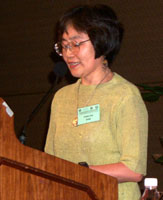 |
|
|
 Steve
Iddings, World Health Organization described
various initiatives that focus on integrating health and environmental
concerns into national planning for sustainable development, such
as the Healthy Cities Movement and environmental health impact
assessment projects. Along with Bangladesh, he expressed great
concern regarding dangerous levels of arsenic in groundwater in
the Asian and Southeast Asian region.
Steve
Iddings, World Health Organization described
various initiatives that focus on integrating health and environmental
concerns into national planning for sustainable development, such
as the Healthy Cities Movement and environmental health impact
assessment projects. Along with Bangladesh, he expressed great
concern regarding dangerous levels of arsenic in groundwater in
the Asian and Southeast Asian region.
|
| Banners
outside the conference center: one welcoming delegates to Asia-Pacific
Regional Meeting; the other, welcoming WTO Director-General Michael
Moore, who was in town for bilateral trade talks between Vietnam and
Cambodia |
|
ENB
Managing Editor speaks with Herman Sips of the Netherlands (left)
and with Hans Peter Dejgaard Kristensen and René Karottki of Denmark
|
| ENB
writer Alison Ormsby speaks with Herman Sips of the Netherlands (left)
and ENB writer speaks with Christo Van Noordwyk (right) |
| Delegates
look over the final document |

 Linkage's
Portal to the Johannesburg Summit 2002 Linkage's
Portal to the Johannesburg Summit 2002
 ENB
Coverage of the First Preparatory Session of the World Summit on Sustainable
Development ENB
Coverage of the First Preparatory Session of the World Summit on Sustainable
Development
 ENB
Coverage of the UNECE Regional Ministerial Meeting for the World Summit
on Sustainable Development ENB
Coverage of the UNECE Regional Ministerial Meeting for the World Summit
on Sustainable Development
 ENB
Coverage of the African Regional Preparatory Meeting for the World Summit
on Sustainable Development ENB
Coverage of the African Regional Preparatory Meeting for the World Summit
on Sustainable Development
 ENB
Coverage of the West Asia Regional Preparatory Meeting for the World Summit
on Sustainable Development ENB
Coverage of the West Asia Regional Preparatory Meeting for the World Summit
on Sustainable Development
 ENB
Coverage of the Latin America and Caribbean Regional Preparatory Meeting
for the World Summit on Sustainable Development ENB
Coverage of the Latin America and Caribbean Regional Preparatory Meeting
for the World Summit on Sustainable Development
 UN
Economic and Social Commission for Asia and the Pacific UN
Economic and Social Commission for Asia and the Pacific
 Asia
Pacific Regional Preparatory Process Asia
Pacific Regional Preparatory Process
 Stakeholder
Segment at the Asia-Pacific Regional PrepCom Stakeholder
Segment at the Asia-Pacific Regional PrepCom
 South
Africa Summit Site South
Africa Summit Site
 UN
Official Summit Website UN
Official Summit Website
|



